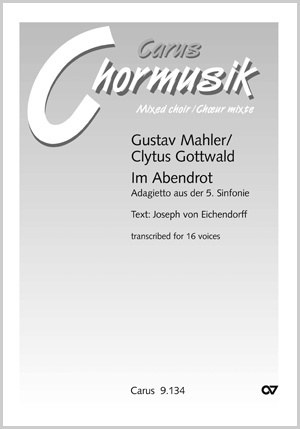Richard Strauss & Gustav Mahler: Transcriptions by Clytus Gottwald – Arnold Schönberg: Friede auf Erden
Clytus Gottwald possessed the special gift of translating the most diverse compositions for solo voice and instrumental accompaniment into a pure, polyphonic choral sound. He was rightly dubbed by music critics the “father” of modern choral singing.
This recording by the Kammerchor Stuttgart under the direction of Frieder Bernius features ten songs by Richard Strauss into which Gottwald breathes a choral soul with seemingly infinite creativity. These are complemented by a stunning 16-part transcription of the “Adagietto” from Gustav Mahler’s 5th Symphony. Listeners are also treated to an original composition, namely Friede auf Erden (Peace on Earth), one of the few choral works of the Second Viennese School, presented here in the year of Arnold Schoenberg’s 150th birthday. With this program, the Kammerchor Stuttgart once again confirms its position as one of the world’s leading vocal ensembles.
Contents
-
Composer
Richard Strauss
| 1864-1949Bereits mit sechs Jahren beginnt der Sohn des Musikers Franz Joseph Strauss und dessen Frau Josephine mit dem Komponieren, bis zu seinem 18. Geburtstag liegen bereits etwa 140 Stücke, darunter knapp 60 Lieder und über 40 Klavierwerke, vor. 1881 beginnt dann seine steile Karriere mit seinem opus 1, dem Festmarsch für großes Orchester. 1886 tritt Strauss in seiner Heimatstadt München eine Stelle als dritter Kapellmeister an der Hofoper an. Dort hatte er Zeit, sein Repertoire zu vertiefen. In den folgenden vier Jahren entstehen u.a. zahlreiche Lieder, wie das Ständchen op. 17,2, das zusammen mit Von dunklem Schleier umsponnen op. 17,4 und Nicht im Schlafe hab ich das geträumt op. 48,1 beim Carus-Verlag erschien. 1905 und viele Liedkompositionen später, schreibt der bereits gefeierte Richard Strauss auch mit einer Oper Erfolgsgeschichte. Die Opern-Adaption von Oscar Wilds Salome, deren Text Strauss selbst ins Deutsche übersetzte, gilt bei seinen Anhängern als Inbegriff moderner Opernmusik. Personal details
-
Arranger
Clytus Gottwald
| 1925-2023The choral conductor, composer and musicologist Clytus Gottwald (1925 - 2023) made significant contributions to contemporary choral music. As editor for New Music at Südfunk Stuttgart and founder and director of the Schola Cantorum Stuttgart, he was in productive exchange with his contemporaries, Pierre Boulez, Mauricio Kagel, György Ligeti, Luigi Nono, Karlheinz Stockhausen and many others. With his Schola Cantorum, a 16-voice chamber vocal ensemble, Gottwald decisively shaped the a cappella choral culture of the highest technical level that is taken for granted today. Clytus Gottwald's transcriptions of piano songs and instrumental pieces for unaccompanied choir are appreciated by choirs all over the world. Modelled on the style of Ligeti, his works set the highest of musical standards. Clytus Gottwald has received several awards for his services, including the Cultural Prize of Baden-Württemberg in 2009, the European Church Music Prize in 2012, and the Cross of Merit of the Federal Republic of Germany in 2014. His importance for the development of contemporary choral music cannot be overestimated. Personal details
-
Choir
Kammerchor Stuttgart
The Kammerchor Stuttgart is regarded as one of the best ensembles of its kind. Over its fifty-year existence, Frieder Bernius has developed the choir into an exceptional ensemble acclaimed by audiences and press alike. This has led to invitations for the choir to perform at all the important European festivals. In Germany the chamber choir performs at festivals and in concert halls in repertoire ranging from the 17th to the 21st century. Frieder Bernius and his ensemble have received numerous accolades for their contribution to new music. The Kammerchor Stuttgart has made over 80 CDs and LPs, numerous of which have been awarded international recording prizes (including the Edison award, Diapason d’or, Gramophone Choice, Classical Internet Award, International Classical Music Award, and German Record Critics’ Award prizes). The International Federation for Choral Music has invited the ensemble to sing at the 1st, 4th and 10th World Symposia on Choral Music in Vienna, Sydney and Seoul. Regular tours of North America and Asia since 1988 and a South America tour reflect the Kammerchor Stuttgart’s international reputation. Since 1984 the top ensemble has also been invited to Israel biennially. Personal details
-
Conductor
Frieder Bernius
| 1947Frieder Bernius’s work has earned great worldwide recognition. He is in demand internationally as a conductor and as a teacher. His principal artistic collaborators are the ensembles he founded himself, the Kammerchor Stuttgart, the Barockorchester Stuttgart, the Hofkapelle Stuttgart and the Klassische Philharmonie Stuttgart. As a guest conductor, he has collaborated repeatedly with, for example, the SWR Vokalensemble Stuttgart, the Deutsche Kammerphilharmonie Bremen, the Stuttgarter Kammerorchester and the Streicherakademie Bozen. Great stylistic versatility is Frieder Bernius’s hallmark. Whether he conducts vocal works by Monteverdi, Bach, Händel, Mozart, Beethoven, Fauré and Ligeti, stage music by Mendelssohn or symphonies by Haydn, Burgmüller and Schubert, his work always aims for a sound that is at once unmistakably personal and at the same time oriented towards the original period sound ideal. He devotes himself equally to the rediscovery of 18th century operas and to first performances of contemporary compositions. He is particularly interested in the musical history of southwestern Germany. Carus-Verlag has awarded Frieder Bernius a Golden CD for his complete recording of the sacred music of Felix Mendelssohn Bartholdy. The award was presented to him during the German Choir Festival in Stuttgart 2016. The sale of over 250,000 recordings, which has been acclaimed with a number of awards, has made a not insignificant contribution to what today is the obvious presence of Mendelssohn's complete œuvre in the concert repertoire. Personal details
-
Soloist - harp
Florian Pedarnig
Frequent questions about this work
 There are no questions and answers available so far or you were unable to find an answer to your specific question about this work? Then click here and send your specific questions to our Customer Services!
There are no questions and answers available so far or you were unable to find an answer to your specific question about this work? Then click here and send your specific questions to our Customer Services!















